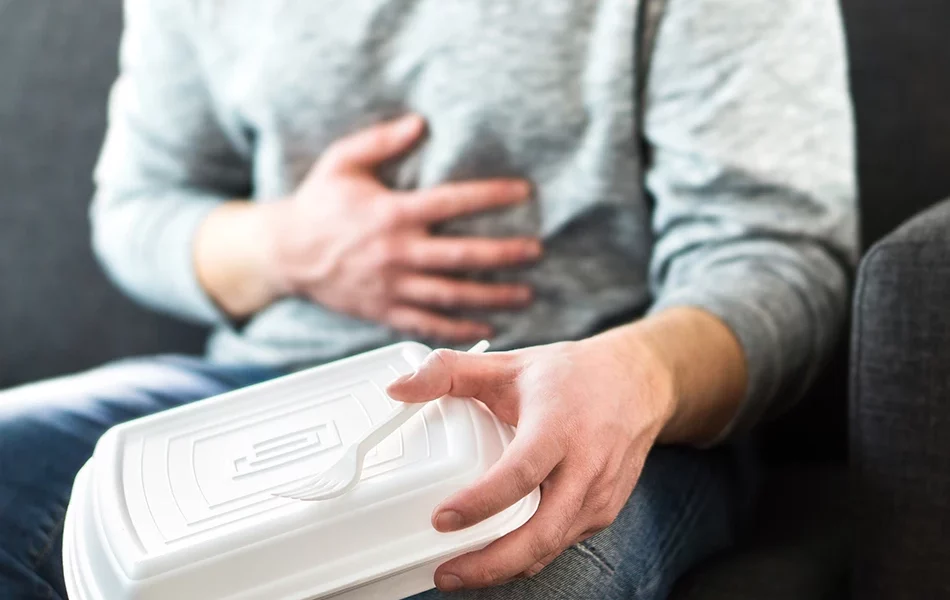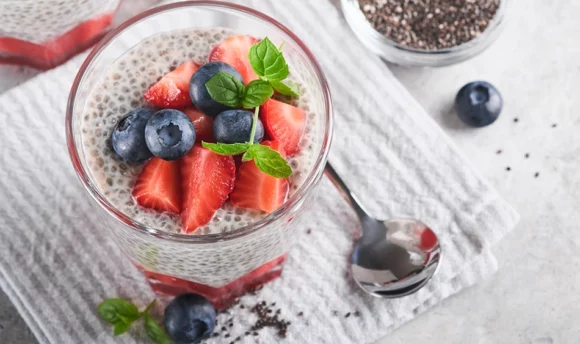Understanding Diarrhea After Eating: Why It Happens and What to Do
Diarrhea after eating is uncomfortable and can disrupt your daily life. Here is how you can identify what is causing it and treat it efficiently at home.

Do you experience diarrhea after eating?
If yes, you may be suffering from a condition known as postprandial diarrhea. It can be acute (short-term) or chronic (persistent), but in either case, it is uncomfortable and disruptive.
Postprandial diarrhea can stem from several underlying causes. Hence, choosing an effective treatment will depend on identifying and eliminating the trigger, which is exactly what this article aims to help you with.
How Common Is Diarrhea After Eating?
Postprandial diarrhea isn’t uncommon. However, its frequency depends on the underlying causes since it is more of a symptom than a disease in itself.
Diarrhea after eating might manifest for many reasons, including lactose intolerance, certain medications, or even chronic illnesses like dumping syndrome, IBS, and microscopic colitis, among others.
For instance, nearly 3 million adults in the US suffer from inflammatory bowel disease (IBD), which can trigger this unpleasant process. Similarly, about 1 in 6 people get food poisoning each year, and 19–21 million Americans are affected by stomach flu or viral gastroenteritis each year.
What Causes Acute Diarrhea After Eating?
Acute diarrhea lasts 1–2 days and might develop for various reasons. For example, diarrhea after eating can indicate food poisoning. However, if you experience postprandial diarrhea often, chances are you have a food allergy.
Below are the common factors that cause diarrhea:
#1 Food poisoning
Eating contaminated food is one of the leading causes of food poisoning. Food might be contaminated by bacteria, viruses, parasites, or even other organisms. Once these harmful organisms enter your digestive system, they can cause acute diarrhea.
Apart from watery stools, other food poisoning symptoms include abdominal pain or cramps, nausea, vomiting, and fever.
The onset of these symptoms and how long they take to resolve vary depending on the type of pathogen you have ingested. For instance, food poisoning caused by staphylococcus aureus (S. aureus) may last 30 minutes to 8 hours after eating.
#2 Food intolerance
Some people’s digestive systems aren’t built to digest certain foods, leading to food intolerance. The most common food intolerance is lactose intolerance, the inability to digest lactose, a type of sugar found in dairy foods.
Experts say nearly 68% of the world’s population has lactose intolerance. When these people consume dairy products, they might start experiencing gastrointestinal discomfort, including acute diarrhea.
Besides lactose, people might also be intolerant to gluten, caffeine, amines, sulfites, and fructose. Though symptoms vary, typically, food intolerance leads to diarrhea, flatulence, vomiting, a feeling of fullness, nausea, and abdominal pain.
#3 Viral infections
Stomach flu, or viral gastroenteritis, is a viral infection commonly caused by norovirus and rotavirus. The condition heightens the sensitivity of your digestive tract, leading to acute diarrhea and vomiting.
Symptoms stemming from viral infections usually resolve after a few days, but diarrhea may persist for a little longer.
#4 Parasites
Several parasites trigger diarrhea after eating. The most common foodborne illness-causing parasites include Entamoeba histolytica, Cryptosporidium enteritis, and Giardia lamblia.
An interesting point about parasitic infections is that their symptoms, including loose stools, won’t resolve until a healthcare professional diagnoses and removes the parasite.
Parasites causing diarrhea are relatively infrequent in developed countries. Typically, people contract these infections when they travel abroad and eat food contaminated by parasites. Such infections are a serious health burden in African, Asian, and Latin American countries.
#5 Certain medications and supplements
Sometimes, people experience diarrhea after taking certain medications like antacids and antibiotics. The most probable reason for this might be the disruption of normal functioning of the gastrointestinal tract.
For instance, certain drugs like laxatives and some antacids containing magnesium stimulate the secretion of fluids into the intestine, leading to acute diarrhea.
It is worth noting that not everyone will experience diarrhea as a side effect of taking medications or supplements. In addition, the severity of symptoms may vary from person to person, and they tend to resolve once you stop taking the medicines.
#6 Toddler’s diarrhea
As the name suggests, toddler’s diarrhea is a form of chronic nonspecific diarrhea that develops in children aged 6 months to 5 years. The exact cause is not well understood. However, several factors are believed to trigger diarrhea.
To begin with, toddler’s diarrhea occurs in children who excessively consume fruit juices and sweetened beverages. The high amount of sugar draws water into the intestine, leading to watery stools.
Another theory about toddler’s diarrhea is that it manifests in children with a fast gut transit time. In simple words, the food moves through their digestive system faster, leaving not much time for proper water absorption.
What Causes Chronic Diarrhea After Eating?
Chronic diarrhea lasts for over 4 weeks and is characterized by 3 or more watery bowel movements per day.
A wide range of factors can trigger chronic diarrhea. It might also be a symptom of underlying health conditions, such as hormonal disorders (diabetes, hyperthyroidism, etc.), irritable bowel syndrome, or irritable bowel disease.
#1 IBS
Nearly 10–15% of people worldwide suffer from irritable bowel syndrome (IBS), making it the most common disorder of the large intestine.
More than a disease, irritable bowel syndrome (IBS) is a group of gastrointestinal symptoms.
It causes either postprandial diarrhea (IBS-D) or constipation (IBS-C), alongside many other symptoms, like abdominal cramps, changes in bowel movement, bloating, lethargy, and heartburn.
While the exact cause of IBS isn’t well understood, it is believed to be an interplay of factors like stress, dietary changes, and certain foods and medications.
If you have IBS, you may experience loose stools, infrequent bowel movements, and the inability to control the urge to poop.
#2 Crohn’s disease
Crohn’s disease is a chronic inflammatory bowel disease (IBD) characterized by inflammation in the lining of the gastrointestinal tract. The condition can affect any part of the digestive tract but is most prevalent in the intestines.
Symptoms caused by Crohn’s disease vary in severity from person to person. People suffering from the condition often experience diarrhea after eating, abdominal pain, reduced appetite, weight loss, fatigue, and even blood in stools.
When it comes to postprandial diarrhea associated with Crohn’s disease, the duration of watery bowel movements after eating varies.
A few people report experiencing diarrhea immediately after having a meal, while others don’t notice any relation between diet and chronic diarrhea.
#3 Celiac disease
Celiac disease is an autoimmune disorder where food with gluten, a protein found in grains like wheat, barley, and rye, causes the immune system to react abnormally. The immune reaction/attack is aimed at the intestine, causing damage.
Chronic diarrhea caused by celiac disease is often smelly, and the stools tend to float rather than sink.
Nearly 2 million people in the US have celiac disease. The primary treatment plan for this condition is a strict gluten-free diet.
People with celiac disease should check the labels whenever they eat out or buy packaged products since gluten might be present in many food items that one may not immediately think about.
#4 Gallbladder removal
The gallbladder is a small organ located right beneath the liver that stores and concentrates bile, an essential digestive fluid.
When you eat food, especially fatty foods, the gallbladder releases bile into the small intestine to help with digestion and dietary fat absorption.
When gallstones form in the gallbladder and cause extreme pain, healthcare professionals recommend a gallbladder removal surgery or cholecystectomy.
Without the gallbladder, the bile formed in the liver directly flows into the small intestine. The excess bile acts as a laxative, making stools watery and causing frequent bowel movements.
Typically, post-gallbladder removal diarrhea resolves within a few days or weeks following the surgery. Nonetheless, some people continue experiencing chronic diarrhea for longer.
#5 Dumping syndrome
Dumping syndrome is a disorder of digestive health that develops after certain types of surgeries, such as bariatric surgery or weight loss surgery. It occurs when food moves too quickly through the intestine, leading to frequent bowel movements.
Dumping syndrome is divided into early and late dumping. The former is when you experience diarrhea within 15–30 minutes after eating. The latter is when diarrhea occurs 1–3 hours after eating.
Dumping syndrome is also called rapid gastric emptying because the emptying of the stomach into the small intestine happens faster than normal. In this case, postprandial diarrhea is mainly triggered by eating foods high in sugar.
#6 Microscopic colitis
Microscopic colitis is the inflammation of the colon or large intestine that results in frequent diarrhea. Diagnosis of this condition usually requires tissue microscopy, which is where its name comes from.
There are two types of microscopic colitis: collagenous colitis (a thick layer of collagen forms in the colon) and lymphocytic colitis (lymphocytes develop on the large intestine tissue).
Chronic diarrhea stemming from microscopic colitis may occur immediately after eating. In addition, it doesn’t improve with ongoing treatment.
Apart from watery stools, other symptoms of microscopic colitis include abdominal pain, weight loss, fatigue, and inability to control a bowel movement, among others.
How to Relieve Diarrhea After Eating?
Acute postprandial diarrhea isn’t severe and can be treated at home. Remedies involve a combination of measures, such as avoiding trigger foods, drinking plenty of water, and taking over-the-counter medications as a last resort.
#1 Drink plenty of water
When you experience diarrhea after eating, the food quickly passes through your gastrointestinal tract, leaving little time for fluid and mineral absorption. This can lead to dehydration and associated symptoms like dizziness, dry mouth, and weakness.
Drinking plenty of water is the best way to replenish lost fluids. You can also drink clear soups, broth, watered-down fruit juices, herbal teas, or rice water. Ginger ale is particularly good for soothing digestive symptoms.
In addition, oral rehydration solutions (ORS) contain a combination of water, sugar, and salt that help replace lost fluids and electrolytes. You can purchase them from drugstores or make them at home by combining sugar and salt in clear water.
However, it is important to avoid caffeine, alcohol, soda, and sweetened beverages as they can worsen gastrointestinal symptoms.
#2 Eat BRAT foods
Banana, Rice, Applesauce, and Toast, or BRAT diet, is an expert-recommended diet to treat acute diarrhea at home. These are bland foods, low in fiber and high in starch, meaning they are easy to digest and bind the stools together.
Nonetheless, the BRAT diet isn’t nutritionally balanced. It is meant to give your digestive system a break and alleviate symptoms of postprandial diarrhea. Hence, you should only stick to it for a short period (24–48 hours).
#3 Avoid certain foods
Diarrhea after eating might be caused by various factors, including food intolerance, food poisoning, and viral infections.
So, if you experience diarrhea, you should typically eat bland foods and avoid trigger foods that can worsen symptoms, such as dairy foods (particularly those with lactose intolerance), fatty foods, spicy foods, and any other products that cause flatulence like lettuce, legumes, broccoli, and Brussels sprouts.
#4 Take probiotics
Conditions like irritable bowel syndrome and sugar malabsorption, antibiotic use, and viral infections can alter the gut microbiota, which may lead to postprandial diarrhea. If that is the case, restoring gut microbial balance can help cure eating diarrhea.
An easy way to do this is by consuming probiotics. Probiotics are gut-friendly microorganisms that are essential for proper digestion and overall well-being. They are available in the form of probiotic supplements for diarrhea but are also present in foods like yogurt, kimchi, kombucha, and sourdough bread.
#5 Take antibiotics
While antibiotics can provide relief, they aren’t always recommended as a first-line treatment plan for postprandial diarrhea.
Antibiotics are used only if bacterial infections cause diarrhea, and in such cases, they are always prescribed by a healthcare professional.
#6 Consider food allergies
If you have or suspect food allergies or intolerances, eliminate the trigger foods from your diet. Common allergens include nuts, dairy products, eggs, shellfish, and gluten. Read labels and ask about ingredients when you eat out.
Nonetheless, always make sure to consult a healthcare professional for thorough analysis. This should make it easier to find the potential triggers.
#7 Practice proper food safety
Maintaining proper hygiene during food preparation and handling is vital to preventing foodborne illness.
Wash your hands thoroughly with soap and warm water before cooking or eating food. According to the Centers for Disease Control and Prevention (CDC), this measure alone can prevent diarrheal diseases by up to 40%.
In addition, clean the kitchen surface, utensils, and cutting boards regularly. Ensure food items are stored at appropriate temperatures to prevent spoilage and food poisoning.
#8 Relax
Sometimes, postprandial diarrhea occurs as a result of stress. When you’re stressed, your brain releases hormones that can trigger changes in your gastrointestinal system.
If you suspect stress might be the underlying cause behind your watery bowel movement, consider practicing relaxation techniques, such as deep breathing exercises, yoga, meditation, or using mental health apps that support that.
#9 Opt for over-the-counter treatments
While it is essential to seek medical attention if your postprandial diarrhea persists or is severe, over-the-counter (OTC) medications can relieve mild cases.
The most commonly used anti-diarrheal medications include loperamide (Imodium), bismuth subsalicylate (Kaopectate or Pepto-Bismol), and diphenoxylate-atropine (Lomotil).
Nonetheless, remember that these medications shouldn’t be consumed if you have a fever or notice blood in your stools. Instead, consult a healthcare professional as soon as possible.
When should you seek a doctor for acute diarrhea?
Acute diarrhea usually resolves on its own within a few days. The NIDDK recommends seeking medical attention if you notice any of the following symptoms:
- Blood or pus in stools
- Severe abdominal pain or rectal pain
- A fever of 102 degrees or higher
- Severe dehydration (dry mouth and throat, dizziness, and decreased urine output)
- Persistent diarrhea for more than 2 days
- Passing stools 6 or more times in 24 hours
FAQs
Diarrhea after eating can be due to various reasons, including food intolerance, lactose intolerance, allergies, food poisoning, or even chronic conditions, such as ulcerative colitis, IBS, dumping syndrome, and celiac disease.
The urge to poop immediately after eating is referred to as postprandial diarrhea. The condition can be triggered by several factors, including consuming contaminated food, allergies, intolerances, or severe conditions like digestive and kidney diseases and ulcerative colitis.
High-fiber foods or foods containing natural laxatives, like caffeine, also speed up the digestive process, increasing the likelihood of bowel movement right after eating.
Yes. Consuming sugary food draws water into your intestine, increasing bowel movements. In addition, high sugar intake also disrupts the gut microbial balance, leading to digestive and kidney diseases.
A Word From Our MD


Diarrhea can manifest in various forms, postprandial diarrhea being one of them. This type of diarrhea occurs shortly after a meal, sometimes within 30 minutes.
Postprandial diarrhea may also be acute, triggered by temporary diseases, or chronic, caused by serious underlying conditions.
If you suddenly find yourself experiencing diarrhea after a meal, consider resorting to home treatments for a few days. Drink plenty of water, get enough sleep, avoid certain food items, consume the best probiotics, and practice proper food hygiene.
You should also watch out for warning signs of dehydration and blood or pus in your stools during this time. If you notice any of those or have been enduring postprandial diarrhea for more than 5 days, consult a healthcare professional for proper medical treatment.
Conclusion
Postprandial diarrhea might stem from various factors, including certain foods, infections, and severe GI conditions. Apart from loose, watery stools, it might also cause accompanying symptoms like abdominal cramps, pain, flatulence, bloating, and nausea.
It is important to consult a healthcare professional if your diarrhea lasts more than 5 days or if you notice symptoms like fever, blood in stool, and dehydration. They will provide an accurate diagnosis and recommend a proper medical treatment.

















































 Select your language:
Select your language: 









